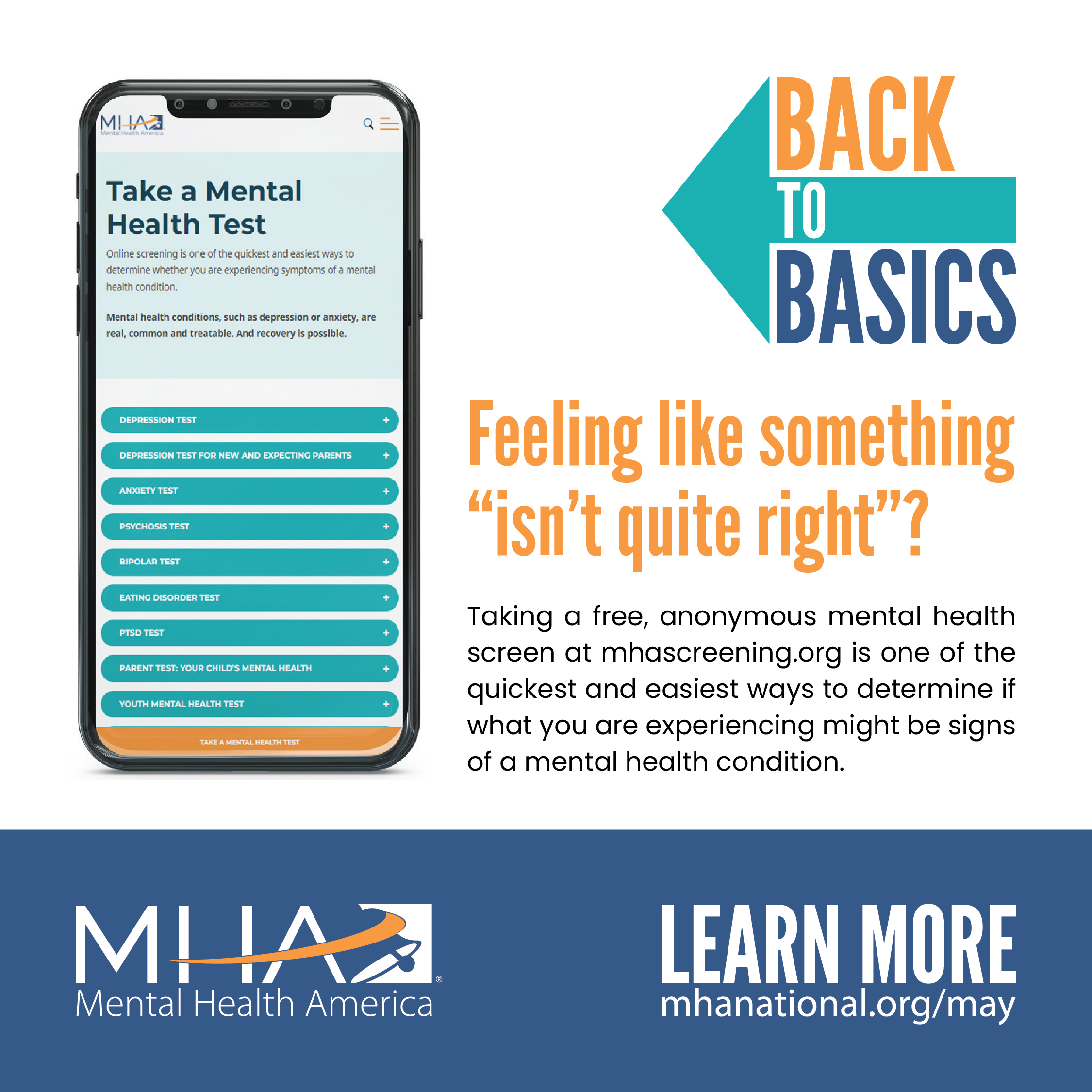May 4, 2022
Mental Health America takes 2022 Mental Health Month ‘Back to Basics’

In order to raise awareness and celebrate mental health, May has been recognized annually as “Mental Health Month” since 1949. With mental health entering more and more of individuals’ daily conversations, it’s critical that everyone has a solid foundation of knowledge about mental health. That’s why for Mental Health Month this year, Mental Health America (MHA) is getting back to basics.
The 2022 theme – “Back to Basics” – provides foundational knowledge about mental health and mental health conditions and information about what individuals can do if their mental health is a cause for concern.
Since the start of the pandemic, more and more people are talking about mental health. An increasing number of individuals are starting to see it for what it is: one important component of overall health and well-being, just like physical health. But mental health conditions, resources and conversations can still feel complicated and out of reach.
“As we continue to prioritize overall health and wellness via our Healthy Boiler Program, we focus on five main areas of overall wellness, including behavioral health,” says Candace Shaffer, senior director of benefits in Human Resources.” During Mental Health Month and year-round, Purdue University wants to remind everyone that mental illnesses are real and recovery is possible. We hope the tools and resources we continue to share with the Purdue community help individuals navigate any challenges or concerns related to their mental health and well-being.”

Mental health screenings
MHA shares that life can be challenging, but every day shouldn’t feel hard or out of a person’s control. If it does, one of the quickest and easiest ways to determine whether an individual is experiencing symptoms of a mental health condition is to take a mental health screening.
According to MHA, the delays in treatment for mental health conditions are longer than for many other health conditions. Getting screened increases the chances of getting treatment. MHA has free, anonymous and scientifically validated mental health screens. Screening results can be used to start a conversation with a primary care provider (PCP) or a trusted friend or family member, and individuals can begin to plan a course of action for addressing their mental health concerns and needs.
MHA shares risk factors for mental health conditions include:
- Trauma, which can be a one-time event or ongoing.
- Environment and how it impacts an individual’s health and quality of life (also known as social determinants of health like financial stability and health care access).
- Genetics
- Brain chemistry.
- Habits and lifestyle such as a lack of sleep.
Individuals may have a more difficult time understanding the risk factors for mental health condition for themselves. MHA recommends that people take the time to ask themselves about their thoughts, feelings and behaviors to see if this is part of a pattern that may be caused by a mental health condition.
Here are some questions to get started:
- Have things that used to feel easy started feeling difficult?
- Does the idea of doing daily tasks like making your bed now feel really, really hard?
- Have you lost interest in activities and hobbies you used to enjoy?
- Do you feel irritated, possibly to the point of lashing out at people you care about?
Purdue has information and resources available to assist (including SupportLinc and LiveHealth Online Psychology and Psychiatry), as do many community mental health organizations, including MHA, National Alliance on Mental Illness (NAMI) and Suicide Prevention Resource Center.
Having a widespread understanding of the topic can help someone be more informed if they or someone they know is experiencing a mental health condition or crisis. While one in five people will experience a mental illness during their lifetime, everyone faces challenges in life that can affect their behavioral health.
Questions
Any questions regarding benefits coverage or mental health resources available to faculty, staff and dependents can be directed to Human Resources at hr@purdue.edu, HRHelp (secure email) or by phone at 765-494-2222 and toll-free at 877-725-0222.
ADDITIONAL RESOURCES FOR FACULTY, STAFF AND STUDENTS
In an effort to help Purdue employees manage stress, anxiety and more, a list of tools and resources has been compiled; see the Mental Health Resources webpage for a variety of available resources.
Purdue health plan coverage
As a reminder, information on how the Purdue health plans supports behavioral health is available:
- Behavioral health referral locations by campus
- Purdue medical plan coverage – mental health / substance abuse
- Treatment for mental health conditions, substance abuse disorders covered like physical illness
To assist students
Faculty and staff, who work with students or have a student at home, can direct them to the resources below for behavioral health assistance. Note: LiveHealth Online Psychology and LiveHealth Online Psychiatry services are also available to Purdue students who are covered on a Purdue health plan. Mental health visits through LiveHealth Online are covered at 100 percent on the Purdue student health plan.
Office of the Dean of Students
- Continuous Network of Support
- Services and Information
- Presentations & Trainings
- Student of Concern Reporting Link
Counseling & Psychological Services (CAPS)
- Therapy Services at CAPS
- Self-help Resources
- Group Therapy
- CAPS YouTube channel
- NAMI On Campus – A free, virtual support group on campus.
- Thriving Campus – Service that provides students a way to search for mental health providers in many areas, locally and across the country.
- WellTrack – Interactive, self-help therapy app for students.

